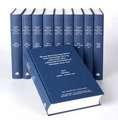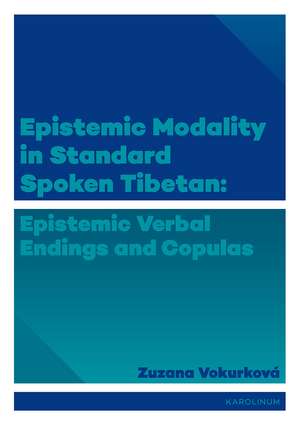Epistemic Modality in Standard Spoken Tibetan: Epistemic Verbal Endings and Copulas: Emersion: Emergent Village resources for communities of faith
Autor Zuzana Vokurkováen Limba Engleză Paperback – 12 mar 2018
The Sino-Tibetan language family is the second largest in the world, and standard Tibetan is the most widely spoken language in the Tibetic group. A comprehensive introduction to epistemicity in standard spoken Tibetan, this book examines the grammatical expression of a variety of epistemic modalities—rather, the myriad ways in which a speaker indicates their confidence in the knowledge on which their statement is based—through numerous examples of epistemic types. It elucidates the complex system of epistemic verbal endings and epistemic copulas, or connecting words, employed in the spoken language, analyzing them from semantic, syntactic, and pragmatic viewpoints.
Din seria Emersion: Emergent Village resources for communities of faith
-
 Preț: 144.99 lei
Preț: 144.99 lei -
 Preț: 147.26 lei
Preț: 147.26 lei - 8%
 Preț: 311.68 lei
Preț: 311.68 lei -
 Preț: 146.50 lei
Preț: 146.50 lei - 18%
 Preț: 348.59 lei
Preț: 348.59 lei -
 Preț: 273.93 lei
Preț: 273.93 lei -
 Preț: 548.71 lei
Preț: 548.71 lei - 12%
 Preț: 290.56 lei
Preț: 290.56 lei - 8%
 Preț: 360.28 lei
Preț: 360.28 lei -
 Preț: 208.31 lei
Preț: 208.31 lei - 8%
 Preț: 563.24 lei
Preț: 563.24 lei -
 Preț: 302.76 lei
Preț: 302.76 lei -
 Preț: 279.55 lei
Preț: 279.55 lei -
 Preț: 176.35 lei
Preț: 176.35 lei - 18%
 Preț: 2261.34 lei
Preț: 2261.34 lei -
 Preț: 106.35 lei
Preț: 106.35 lei -
 Preț: 183.89 lei
Preț: 183.89 lei - 9%
 Preț: 352.50 lei
Preț: 352.50 lei - 9%
 Preț: 352.77 lei
Preț: 352.77 lei - 8%
 Preț: 346.31 lei
Preț: 346.31 lei -
 Preț: 209.88 lei
Preț: 209.88 lei -
 Preț: 176.49 lei
Preț: 176.49 lei - 6%
 Preț: 324.95 lei
Preț: 324.95 lei -
 Preț: 101.43 lei
Preț: 101.43 lei -
 Preț: 144.80 lei
Preț: 144.80 lei -
 Preț: 215.51 lei
Preț: 215.51 lei -
 Preț: 163.52 lei
Preț: 163.52 lei -
 Preț: 216.08 lei
Preț: 216.08 lei -
 Preț: 182.98 lei
Preț: 182.98 lei -
 Preț: 128.69 lei
Preț: 128.69 lei -
 Preț: 156.84 lei
Preț: 156.84 lei -
 Preț: 185.37 lei
Preț: 185.37 lei -
 Preț: 115.82 lei
Preț: 115.82 lei -
 Preț: 67.35 lei
Preț: 67.35 lei -
 Preț: 179.04 lei
Preț: 179.04 lei -
 Preț: 167.85 lei
Preț: 167.85 lei -
 Preț: 115.53 lei
Preț: 115.53 lei -
 Preț: 160.63 lei
Preț: 160.63 lei -
 Preț: 138.81 lei
Preț: 138.81 lei -
 Preț: 307.53 lei
Preț: 307.53 lei -
 Preț: 133.99 lei
Preț: 133.99 lei -
 Preț: 138.26 lei
Preț: 138.26 lei -
 Preț: 229.92 lei
Preț: 229.92 lei -
 Preț: 127.89 lei
Preț: 127.89 lei -
 Preț: 208.54 lei
Preț: 208.54 lei - 18%
 Preț: 502.35 lei
Preț: 502.35 lei - 9%
 Preț: 353.24 lei
Preț: 353.24 lei -
 Preț: 126.25 lei
Preț: 126.25 lei -
 Preț: 92.35 lei
Preț: 92.35 lei - 8%
 Preț: 564.99 lei
Preț: 564.99 lei
Preț: 155.34 lei
Preț vechi: 176.97 lei
-12% Nou
Puncte Express: 233
Preț estimativ în valută:
29.73€ • 30.100$ • 24.71£
29.73€ • 30.100$ • 24.71£
Carte indisponibilă temporar
Doresc să fiu notificat când acest titlu va fi disponibil:
Se trimite...
Preluare comenzi: 021 569.72.76
Specificații
ISBN-13: 9788024635880
ISBN-10: 8024635887
Pagini: 236
Dimensiuni: 152 x 229 x 15 mm
Greutate: 0.7 kg
Editura: Karolinum Press, Charles University
Colecția Karolinum Press, Charles University
Seria Emersion: Emergent Village resources for communities of faith
ISBN-10: 8024635887
Pagini: 236
Dimensiuni: 152 x 229 x 15 mm
Greutate: 0.7 kg
Editura: Karolinum Press, Charles University
Colecția Karolinum Press, Charles University
Seria Emersion: Emergent Village resources for communities of faith
Notă biografică
Zuzana Vokurková is a researcher and senior lecturer in the Seminar of Mongolian and Tibetan Studies of the Institute of South and Central Asia, Faculty of Arts, at Charles University in Prague.
Cuprins
Abbreviations
Introduction
Key Terms
Fieldwork and Corpus
Structure of the Monograph and of the Tibetan Examples
I. The Expression of Epistemic Modality in Standard Spoken Tibetan
1.1 The Lexical Expression of Epistemic Modality
1.2 The Grammatical Expression of Epistemic Modality
II. Classification of Epistemic Verbal Endings and Copulas
2.1 Epistemic Verbal Endings and Copulas of the Type YOD.KYI.RED
2.2 Epistemic Verbal Endings and Copulas with the Final Auxiliary ’DRA
2.3 Epistemic Verbal Endings and Copulas with the Final Auxiliary ‘GRO/’GRO’O
2.4 Epistemic Verbal Endings and Copulas with the Morpheme A
2.5 Epistemic Verbal Endings and Copulas with the Morpheme SA
2.6 Epistemic Constructions swith the SUFFIX MDOG.KHA.PO
2.7 Epistemic Verbal Endings PA.’DUG and PA.YOD
2.8 Epistemic Verbal Endings and Copulas of the Type YOD.PA.YOD
2.9 Epistemic Verbal Endings and Copulas of the Type YONG.NGA.YOD
2.10 Epistemic Verbal Endings with the Morpheme YONG
2.11 Epistemic Verbal Endings and Copulas with the Morpheme BZO
III. Secondary Verbs and Epistemic Verbal Endings
3.1 Secondary Verbs
3.2 Use of Secondary Verbs with Epistemic Verbal Endings
3.3 Summary of the Compatibility of Secondary Verbs with Epistemic Verbal Endings
Conclusion
References
Glossary
Appendix: List of Tam Verbal Endings in Standard Spoken Tibetan
Introduction
Key Terms
Fieldwork and Corpus
Structure of the Monograph and of the Tibetan Examples
I. The Expression of Epistemic Modality in Standard Spoken Tibetan
1.1 The Lexical Expression of Epistemic Modality
1.2 The Grammatical Expression of Epistemic Modality
II. Classification of Epistemic Verbal Endings and Copulas
2.1 Epistemic Verbal Endings and Copulas of the Type YOD.KYI.RED
2.2 Epistemic Verbal Endings and Copulas with the Final Auxiliary ’DRA
2.3 Epistemic Verbal Endings and Copulas with the Final Auxiliary ‘GRO/’GRO’O
2.4 Epistemic Verbal Endings and Copulas with the Morpheme A
2.5 Epistemic Verbal Endings and Copulas with the Morpheme SA
2.6 Epistemic Constructions swith the SUFFIX MDOG.KHA.PO
2.7 Epistemic Verbal Endings PA.’DUG and PA.YOD
2.8 Epistemic Verbal Endings and Copulas of the Type YOD.PA.YOD
2.9 Epistemic Verbal Endings and Copulas of the Type YONG.NGA.YOD
2.10 Epistemic Verbal Endings with the Morpheme YONG
2.11 Epistemic Verbal Endings and Copulas with the Morpheme BZO
III. Secondary Verbs and Epistemic Verbal Endings
3.1 Secondary Verbs
3.2 Use of Secondary Verbs with Epistemic Verbal Endings
3.3 Summary of the Compatibility of Secondary Verbs with Epistemic Verbal Endings
Conclusion
References
Glossary
Appendix: List of Tam Verbal Endings in Standard Spoken Tibetan
